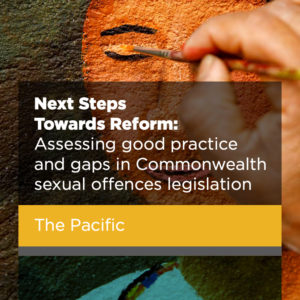Papua New Guinea’s sexual offences laws are in the Criminal Code Act 1974 (as amended) (CCA). The Evidence Act 1974 (EA) contains the evidentiary rules for all criminal offences, including sexual offences.
In 2003, Papua New Guinea made major reforms to the CCA with the passing of the Criminal Code (Sexual Offences and Crimes Against Children) Act 2002. These reforms resulted in a number of positive changes that conform to the good practice standards. These include for example, the introduction of a series of new offences extending ‘rape’ to cover penetration of all orifices by the penis or any other object. The requirement for corroboration of a complaint of sexual assault was removed and a good practice definition of ‘consent’ was introduced into the legislation.
However, Papua New Guinea retains a marital immunity that protects a person from prosecution for child sexual assault if their spouse is over 14 at the time of the act. This does not meet good practice because it only criminalises rape in marriage in limited circumstances. Non-consensual sexual intercourse should be expressly criminalised in the legislation in every circumstance without exception. Allowing a defence or exception of marriage to rape violates human rights and is discriminatory. Good practice requires that marital rape be explicitly prohibited in legislation.
Papua New Guinea also still criminalises consensual same-sex sexual activity between men, with a maximum prison sentence of 14 years. The CCA also uses discriminatory, derogatory and stigmatising language such as ‘unnatural offences’, ‘against the order of nature’, and ‘gross indecency’ and equates consensual same-sex activities with the offence of bestiality. Laws that criminalise consensual same- sex sexual activity, such as ‘buggery’ and ‘sodomy’, should be repealed and all non-consensual sexual acts, including anal ‘rape’, should be included in the standard sexual assaults provisions, such as ‘rape’ and ‘sexual assault’, as well as in child sexual offences. All of these crimes should be gender-neutral.
There are child sexual assault offences, however, they are not comprehensive and are weakened by a defence of consent for sexual offences against children. The age of consent for opposite-sex sexual activity in Papua New Guinea is 16 for unmarried girls and 14 for boys, which is discriminatory and too low in the case of boys.
Papua New Guinea is state party to relevant international human rights treaties, including the Convention on the Elimination of All Forms of Discrimination against Women, Convention on the Rights of the Child, Convention on the Rights of Persons with Disabilities and International Covenant on Civil and Political Rights. Papua New Guinea has not joined the Convention against Torture and Other Cruel, Inhuman or Degrading Treatment or Punishment.
Read more about the criminalisation of LGBT people in Papua New Guinea.
The full assessment of Papua New Guinea is available here.



